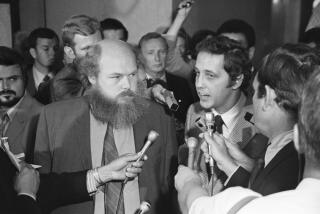R. Huggins, 87; Created ‘Maverick,’ ‘Fugitive’
- Share via
Roy Huggins, the prolific writer-producer whose name is associated with many of television’s biggest hits, including “Maverick,” “The Fugitive” and “The Rockford Files,” has died. He was 87.
Huggins, whose long television career was marked by a flair for creating series concepts and characters that defied convention, died of natural causes Wednesday in Santa Monica.
“I’ll be forever in his debt,” said James Garner, who became a star playing the wisecracking gambler who wasn’t afraid to back out of a fight in the Huggins-created “Maverick” and later played offbeat private detective Jim Rockford in “The Rockford Files,” which Huggins co-created.
“Roy was a giant in the television industry,” said producer Jo Swerling Jr. “He was brilliant. He had a very fertile mind and was a great storyteller. I think he had a sort of natural sense of popular art of the time.”
Beginning in the mid-1950s at Warner Bros., where he helped the movie studio make its transition into television production, Huggins produced “Cheyenne,” a Western starring Clint Walker. The show, which debuted in 1955, was television’s first filmed hourlong series.
In addition to “Maverick,” Huggins created the Western “Colt 45” and the hit detective show “77 Sunset Strip,” which spawned a raft of other hourlong television detective shows.
In 1962, after serving briefly as vice president of 20th Century Fox Television, Huggins joined Universal Television, where he served as executive producer of “The Virginian” in its first year. He also created “Run for Your Life” and served as executive producer of “Alias Smith and Jones.”
While at Universal in the 1970s, Huggins began his association with Stephen J. Cannell and together they created “The Rockford Files” and “City of Angels,” a short-lived detective series starring Wayne Rogers. Huggins also served as executive producer for the Cannell-created “Baretta,” starring Robert Blake.
In 1985, after Cannell formed his own studio, he lured Huggins out of retirement to produce “Hunter.”
*
Coming Up With Idea for ‘The Fugitive’
The most successful Huggins-created series was “The Fugitive,” starring David Janssen as Dr. Richard Kimble, a man who is falsely accused of murdering his wife and then escapes from the authorities to pursue the real killer--a one-armed man.
Huggins came up with the idea for “The Fugitive” in 1960 after leaving Warner Bros.
“Westerns were tremendously popular at the time,” he told The Times in 1993, “and I was trying to figure out how to put that kind of genre into a contemporary environment.
“I wanted to have a hero who behaved like a Western hero--who was totally free, had no permanent residence or commitments or responsibilities.”
But Huggins found no one who shared his enthusiasm. For two years, everyone from his close friends to his agent told him the idea would ruin his career.
“They thought it was distasteful, glorified lawlessness and seemed pointless,” he recalled. “I was so upset I decided to enter graduate school at UCLA to study political theory; I was through with television.”
Only after reluctantly agreeing to pitch a series idea in a meeting with ABC President Leonard Goldenson did Huggins find someone who agreed that “The Fugitive” was a great idea for a TV series.
The show ran from 1963 to 1967, its last episode scoring the largest audience in history at that time.
“The Fugitive” spawned a hit feature film in 1993 starring Harrison Ford and Tommy Lee Jones, a feature sequel and a revival TV series in 2000 for which Huggins again came out of retirement to serve as executive producer.
“I think Roy was very drawn to unconventional heroes,” Cannell said Friday. “The easy and safe thing to do is what you’ve seen before--to do a show that you’ve seen before or characters that you’ve seen before in circumstances you’ve seen before.
“Roy never did that. Roy always came to things with a unique perspective, and that allowed him to create shows like ‘Run for Your Life’ and ‘Maverick.’ He didn’t just follow the normal trend of what television was. What a unique program ‘Run for Your Life’ was--a guy told he’s only got a year left to live and decides to pack all his life into one year. Nobody had done a show like that.”
And “The Fugitive,” Cannell said, “was a very offbeat idea at the time. A guy falsely accused of murdering his wife and on the run from the police. In those days, people said the police would never make a mistake. It was a bold concept. But that was Roy. Roy was a guy who’d take a chance.”
Huggins was born in Littell, Wash. In 1914, he graduated Phi Beta Kappa, summa cum laude from UCLA. At the outbreak of World War II, he was working on his doctorate in political science. While working as a civilian employee of the U.S. government during the war, he was inspired by Raymond Chandler and spent his spare time writing hard-boiled crime fiction.
His first novel, “The Double Take,” was published in 1946. He published two more novels, “Too Late for Tears” and “Lovely Lady, Pity Me,” on which he later loosely based “77 Sunset Strip.”
Huggins’ publishing success led to a writing contract with Columbia Pictures, which released “Too Late for Tears” in 1949. He worked as a contract writer for Columbia and RKO and in 1952, he wrote and directed “Hangman’s Knot,” a Western starring Randolph Scott.
Then came television.
“He taught me everything that I used through my career on how to create and write and produce a television show,” said Cannell, who first met Huggins in the mid-’70s when Huggins was executive producer of “Toma,” a police drama, and Cannell was the producer.
“I couldn’t have been luckier,” said Cannell, who remembers Huggins’ great sense of humor and ageless quality.
“Even when he was in his 80s he was like a guy 30 years old,” Cannell said. “He was always hip, current. He talked the talk of young people. He wasn’t an old man in his head at all.” During his long career, Huggins wrote some 350 scripts and stories, many of them credited under the pseudonym “John Thomas James,” after his three sons.
John Thomas James even had his own parking space at Universal, said Swerling, adding that agents were so impressed by the prolific John Thomas James that they often called to see if he had representation.
“We used to have a lot of fun with that,” said Swerling, adding that one other thing Huggins didn’t get recognition for was coming up with the idea of the Movie of the Week in the 1970s.
Huggins is survived by his wife of 50 years, former actress Adele Mara; three sons, Thomas, John and James; his son and daughter from his first marriage, Bret Huggins and Katherine Huggins Price; and five grandchildren.
A memorial service will be held at 11 a.m. April 13 at St. Martin of Tours, 11967 Sunset Blvd., Los Angeles.
More to Read
The complete guide to home viewing
Get Screen Gab for everything about the TV shows and streaming movies everyone’s talking about.
You may occasionally receive promotional content from the Los Angeles Times.






